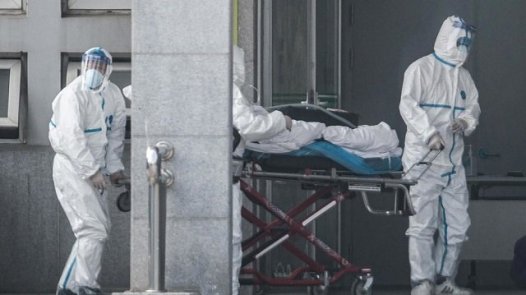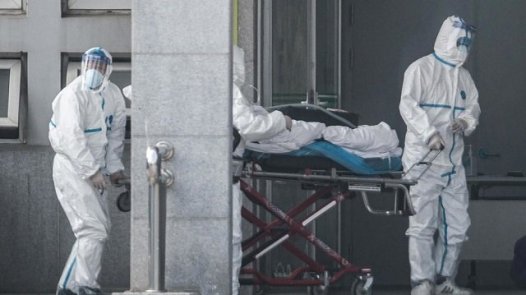How Coronavirus Kills Its Victims
File photo
This essay has two apparently contradictory messages. On the one hand, it affirms that the coronavirus disease, otherwise known as COVID-19, is not necessarily a death sentence.
There are countries, such as Uganda and Vietnam, which have recorded no deaths so far, despite confirmed cases of coronavirus.
Although over 500 deaths have been recorded in Nigeria, nearly double that number has recovered from the disease. But that is only one side of the story.
On the other hand, the coronavirus disease is a death bomb for certain individuals who are infected. That’s why over half a billion people so far have died of the virus worldwide.
True, people with pre-existing conditions, such as heart, lung, or kidney disease, are at greater risk of death, the data so far show that the virus can kill just about anybody.
Yet, there is neither a certified cure nor a vaccine against the virus as of today.
In the search for cure or vaccine, researchers have studied the behaviour of the virus in the last six months, while others have studied selected autopsies of dead victims, in order to understand why so many people have died of the virus. Such knowledge is necessary in order to develop an effective cure or vaccine.
Three findings stand out. First, there is no doubt that the coronavirus is capable of laying its victims to waste as it can cause massive devastation of various organs.
When the virus enters through the mouth, nose, or eyes, its first home is the upper respiratory tract. The virus binds to particular receptors and begin to replicate itself.
The receptors, technically known as Ace-2, help in regulating blood pressure. They are common in the upper respiratory tract but are also found in the lungs, heart, kidney, intestine, blood vessels, and even the brain.
Research shows that the virus may migrate from this initial binding to the receptors in the other organs listed above.
The presence of the virus in these receptors, especially those in the blood lining, may be the reason for the unusually excessive clotting of the blood and why patients with hypertension and diabetes are at very high risk.
Worse still, Ace-2 receptors may help the virus reach as far as the brain, where it binds to the Ace-2 receptors in the brain.
This may well explain some of the bizzare symptoms of the virus, such as loss of taste and smell, erratic breathing, irregular heartbeat, seizures, stroke, and even nervous breakdown.
Second, it has been found that it is not the virus alone, which kills its victims. The body’s defence mechanism deployed in fighting the virus can overreact and cause death.
Here, in a nutshell, is how it happens. When a pathogen (virus, bacterium, or any other microorganism) enters the body, immune cells are attracted to the point of infection to destroy the intruder.
A protein, technically known as cytokine, is released by the body to coordinate the body’s response to the intruder.
In the process, excess white blood cells are produced, which rush to the point of infection to fight it. Inflammation follows as part of the process of healing the body from the infection.
Unfortunately, however, the body’s immune system can overreact, leading to a “cytokine storm”, whereby excess immune cells are produced, leading to hyper-inflammation.
In the process, the body is destroyed along with the virus. The patient may get better and even test negative for the virus, while still in hospital.
However, multiple organs may have been destroyed and blood pressure may drop to dangerous levels. When a patient gets to this level, death often follows.
A third major finding helps to explain why individuals vary in their reaction to coronavirus infection, that is, why some die while others survive, even in old age.
First, although humans share the same genes, the ways in which the genes are regulated in the body differ from person to person.
Therefore, many victims of coronavirus may weather the storm and survive the infection, while others succumb to it, depending on their genetic makeup.
Genetic variation may also explain why Ace-2 receptors are expressed differently in different organ tissues, depending on the individual.
As indicated earlier, the underlying condition of the various organs is also a critical factor. That’s why those with preexisting conditions are at much greater risk.
However, as the above findings and the data on coronavirus deaths show, there have been people with no preexisting condition, who nevertheless still died of the virus. Not just old people, but young folks as well.
It is natural for readers of this essay to ask: What’s the treatment or what’s the best treatment? The simple truth is that, as of today, there is no cure for coronavirus.
Each case is often managed as it comes and as the patient’s condition deteriorates. This is not to say that there are no treatment options.
The naked truth is that no option has been found to completely prevent death in all patients or even in the majority of patients.
That leaves you and me with the non-pharmaceutical option of following the WHO-sanctioned guidelines, provided by the Nigeria Centre for Disease Control and echoed repeatedly by the Presidential Task Force on COVID 19:
* Stay at home, if you are not working or on essential service.
* Wear face masks, if you go out. You should even wear one at home, if you are coughing or sneezing or if someone in your household is.
* Maintain physical distancing of at least six feet (ese bata mefa) whenever you go out.
* Avoid touching your mouth, nose, or eyes.
* Wash your hands frequently with soap or alcohol-based sanitizer.
* Main good overall hygiene at all times, including occasionally wiping door handles, remote controls, and your phones, with disinfectant.
In addition, the oga among us must ensure that their aides, drivers, cooks, gardeners, and other dependents or co-workers follow these guidelines.
They must work with leaders in their primary or secondary communities to educate people about the existence and prevalence of this virus and to let them know that it can kill.
For now, following these mitigation measures is our best bet. To put it in another way, the best cure for coronavirus for now is NOT to catch the disease at all.
***
Source: The Nation



